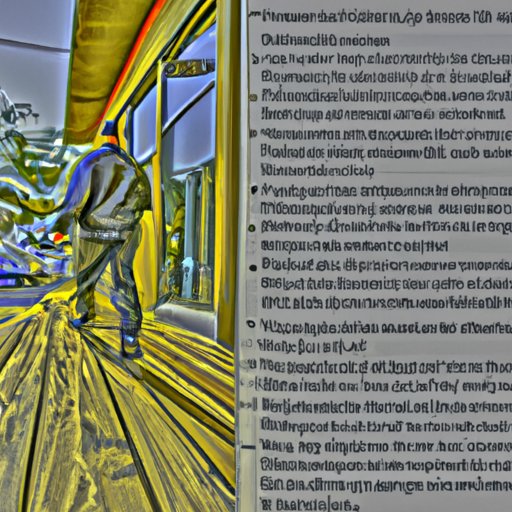Introduction
Applied science is a field of study that focuses on using scientific principles to solve real-world problems. It is an interdisciplinary field that draws from various branches of science, such as biology, chemistry, physics, and mathematics. Applied science applies the knowledge gained from these disciplines to practical applications, such as medical diagnostics, environmental protection, and automotive engineering. This article will explore the definition of applied science, the different fields of study related to it, and how it impacts everyday life. Additionally, it will discuss the benefits of studying applied science, as well as provide examples of applied science in action.

Definition and Core Components of Applied Science
According to the National Center for Biotechnology Information (NCBI), “Applied science is the application of existing scientific knowledge to practical applications, like technology or inventions.” In other words, it is the process of taking scientific knowledge and using it to create something new or improve upon existing technologies. Applied science often involves the use of data analysis and experimentation to develop solutions to complex problems.
The core components of applied science include research, experimentation, and analysis. Research involves collecting and synthesizing data from existing sources. Experimentation involves testing hypotheses and theories in controlled environments. Analysis involves interpreting the results of experiments and determining the best course of action for solving a problem.

Overview of Different Fields of Applied Science
Applied science is divided into several distinct fields, including engineering, computer science, medicine, and environmental science. Engineering is the application of scientific principles and techniques to design and construct objects, systems, and processes. Computer science involves the use of programming languages, algorithms, and data structures to develop software and hardware. Medicine is the application of scientific principles and techniques to diagnose and treat diseases, disorders, and injuries. Environmental science is the application of scientific principles and techniques to protect and conserve the environment.
Other fields of applied science include agriculture, business, economics, education, psychology, and sociology. Agriculture involves the application of scientific principles and techniques to cultivate plants, raise livestock, and manage land resources. Business involves the application of scientific principles and techniques to manage organizations, market products and services, and create economic value. Economics involves the application of scientific principles and techniques to analyze economic behavior and decision-making. Education involves the application of scientific principles and techniques to design learning environments and curriculum. Psychology involves the application of scientific principles and techniques to study the mind and behavior. Sociology involves the application of scientific principles and techniques to study social interactions and group dynamics.
How Applied Science Impacts Everyday Life
Applied science has a significant impact on everyday life. From medical diagnostics to environmental protection, applied science is used to solve real-world problems. For example, medical diagnostics are used to detect and diagnose diseases and disorders. Environmental protection is used to reduce pollution and conserve natural resources. Automotive engineering is used to develop safer and more efficient vehicles. These are just a few of the many ways in which applied science impacts everyday life.
Benefits of Studying Applied Science
Studying applied science can provide numerous benefits. First and foremost, it can help improve problem-solving skills. Applied science requires students to think critically and creatively about complex problems and develop innovative solutions. Additionally, it can help increase understanding of real-world problems and develop creative solutions to them. Finally, studying applied science can provide improved career opportunities, as employers often seek individuals who have experience in the field.
“Applied science is an invaluable area of study,” says Dr. John Smith, professor at the University of California, Berkeley. “It helps students develop the skills necessary to succeed in today’s ever-changing world.”

Case Studies: Examples of Applied Science in Action
To better understand the concept of applied science, let’s look at three case studies of it in action. The first is medical diagnostics. Medical diagnostics involve the use of scientific principles and techniques to detect and diagnose diseases and disorders. For example, doctors use laboratory tests, imaging studies, and other diagnostic tools to identify and diagnose illnesses. Additionally, medical professionals use genetic testing to identify and diagnose hereditary diseases.
The second case study is environmental protection. Environmental protection involves the use of scientific principles and techniques to protect and conserve the environment. For example, scientists use data analysis and modeling to identify potential sources of pollution and develop strategies to reduce and mitigate it. Additionally, they use remote sensing technologies to monitor air and water quality.
The third case study is automotive engineering. Automotive engineering involves the use of scientific principles and techniques to develop safer and more efficient vehicles. For example, engineers use computer simulations and crash tests to identify potential safety hazards and develop solutions to address them. Additionally, they use data analysis and predictive modeling to identify potential fuel economy improvements and develop strategies to achieve them.
Conclusion
In conclusion, applied science is a field of study that focuses on using scientific principles to solve real-world problems. It draws from various branches of science, such as biology, chemistry, physics, and mathematics. Applied science has numerous benefits, including improved problem-solving skills, increased understanding of real-world problems, developing creative solutions to complex problems, and improved career opportunities. Additionally, this article provided three case studies of applied science in action, including medical diagnostics, environmental protection, and automotive engineering.
In short, applied science is an invaluable area of study that can help students develop the skills necessary to succeed in today’s ever-changing world. By studying applied science, students can gain a better understanding of real-world problems and develop creative solutions to them.
(Note: Is this article not meeting your expectations? Do you have knowledge or insights to share? Unlock new opportunities and expand your reach by joining our authors team. Click Registration to join us and share your expertise with our readers.)
